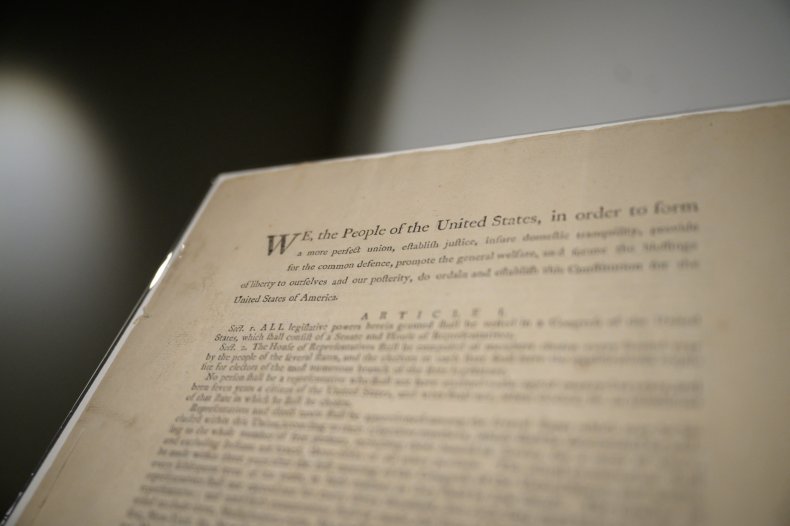"Neither state nor national government shall make or enforce any law abridging the fundamental right of parents to direct the education and upbringing of their children."
It is time to make the above proposed constitutional amendment part of the U.S. Constitution. Although the idea of parents' presumptive authority over the education of their children is deeply rooted in our nation's history and tradition, no such right is expressly codified in the Constitution. This should change.
A century ago, the Supreme Court declared that "[t]he child is not the mere creature of the State; those who nurture him and direct his destiny have the right, coupled with the high duty, to recognize and prepare him for additional obligations." As true as this statement is, such rights find no purchase in the text of the Constitution. Instead, they are aspects of a discredited "substantive due process" reading of the Fifth and Fourteenth Amendments whereby the courts, not the people, determine which rights are "fundamental" enough to merit judicial protection. Lacking any firm textual grounding, the Court's decisions in this doctrinal area have produced an unstable and insecure "liberty."
In Meyer v. Nebraska (1923), the Supreme Court struck down a post-World War I nativist state law prohibiting parents and teachers from teaching children foreign languages. According to the Court, the Fifth Amendment right not to be deprived of "liberty" without due process of law should be understood as protecting parents' substantive right "to instruct their children." Two years later, in Pierce v. Society of Sisters, the Supreme Court struck down an Oregon law requiring children to be taught in public, not private, schools. Citing its previous holding in Meyer, the Supreme Court declared that the state has no power to "standardize its children by forcing them to accept instruction from public teachers only. The child is not the mere creature of the State."
More recently, in Wisconsin v. Yoder (1972), the Supreme Court protected the right of Amish parents to remove their children from public schools after the age of 16. According to the Yoder Court, the earlier decisions of Meyer and Pierce had established "the right of parents to provide an equivalent education in a privately operated system," and that the state may not "unreasonably interfere[] with the interest of parents in directing the rearing of their offspring, including their education in church-operated schools." Finally, in Troxel v. Granville (2000), the Supreme Court struck down a Washington state law that allowed any third party to petition state courts for child visitation rights over parental objections. According to the plurality opinion in Troxel, "the interest of parents in the care, custody and control of their children—is perhaps the oldest of the fundamental liberty interests recognized by this Court."

Although these cases nod toward a constitutional right of parents to direct the education and upbringing of their children, the foundational cases of Meyer and Pierce rely on an approach to constitutional interpretation that the Supreme Court has long since abandoned. As Justice Antonin Scalia pointed out in Troxel, the Meyer and Pierce decisions were decided in "an era rich in substantive due process holdings that have since been repudiated."
"[T]he theory of unenumerated parental rights," Scalia therefore concluded in Troxel, "has small claim to [precedential] stare decisis protection." In fact, the Court splintered in Troxel and failed to produce a majority opinion that explained the nature of parental rights or determined whether they should receive the same strong judicial protection as other "fundamental" rights.
Yet the need for strong judicial protection of parental rights is more urgent than ever. Over the past few years, it has become increasingly clear that the interests of government-led educational institutions are not always in line with, and sometimes substantially diverge from, the interests of parents. Widespread closures of public schools during the pandemic, as well as required "virtual" classes, have convinced thousands of parents to seek alternatives to the instruction provided in government schools. Whether by way of private education, homeschooling or simply increased vigilance over local public schools, we are witnessing a dramatic increase in parental interest and involvement in the education of their children.
This current rise in parental involvement in their children's education will prompt a backlash by government actors invested in controlling children's education. When then-Virginia gubernatorial candidate Terry McAuliffe recently declared that he didn't think "parents should be telling schools what they should teach," this echoed the same government voice that once told Catholic and German parents their role in the education of their children was a matter of government permission, not a constitutional right.
Power-wielding government officials are inevitably tempted to control the education and socialization of others' children, whether driven by a desire to impose a transitory ideology or the wish to suppress dissenting ideas. This temptation, when indulged, must be confronted with countervailing constitutional text.
The ratification of the above amendment would erase once and for all any doubts about the constitutional status of parents' right to direct the education and upbringing of their children. Rather than change current law, the amendment would prevent current law from being abandoned or watered down. Most important of all, it would stand secure as a constitutional right adopted by the people themselves.
Kurt Lash is the E. Claiborne Robins distinguished professor of law at the University of Richmond. He and his wife have three children, all of whom attended public schools and, occasionally, homeschool.
The views expressed in this article are the writer's own.
"right" - Google News
November 16, 2021 at 07:00PM
https://ift.tt/3wSQDaD
The Parents Right Amendment | Opinion - Newsweek
"right" - Google News
https://ift.tt/32Okh02
Bagikan Berita Ini














0 Response to "The Parents Right Amendment | Opinion - Newsweek"
Post a Comment